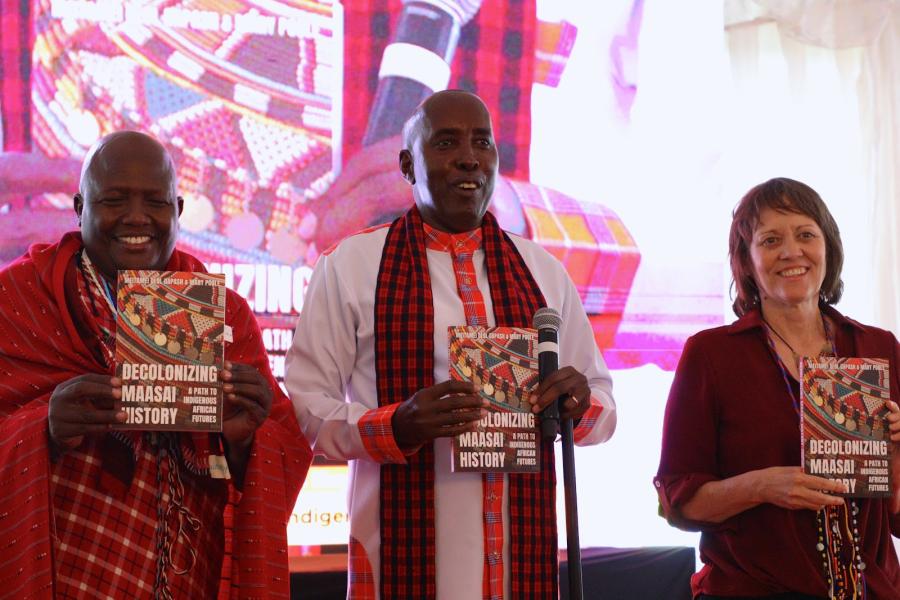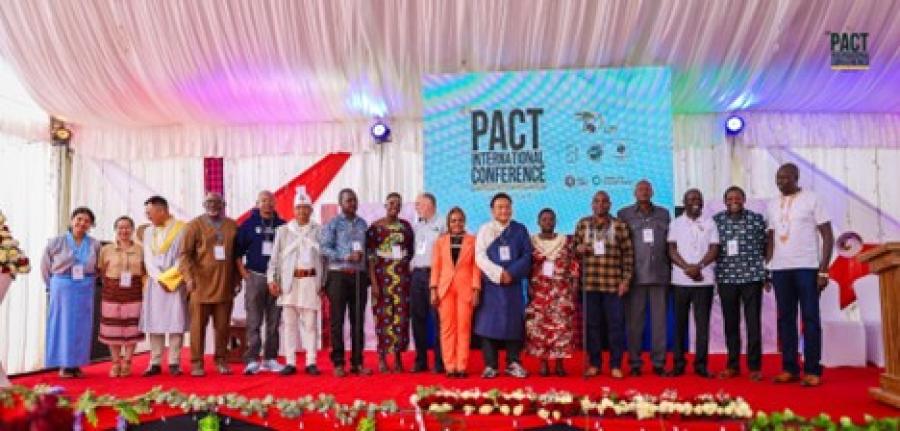As a community, the Maasai of East Africa are grateful for the UN Commission for Indigenous Rights. All the endeavors by the UN have given us hope and awareness. For our brothers in the indigenous fraternity, I want to give a brief explanation of our dilemma as indigenous people.
At the turn of the last century, the colonialists made a thrust into East Africa, entering through the natural port of Mombassa into what is now mainland Kenya. The Maasai, traditional fighters, had a military organization of young peopled called the Moran. We resisted occupation by the colonialists of central Kenya and even helped our other Kenyan tribes escape from slave traders. We forced the slave catchers' caravans to find an alternative route to Uganda by making it dangerous for them to pass through Kenya. For about ten years (1890-1900), we resisted the British colonialists; but we were fighting with spears against machine guns. By 1901-1902 we were a defeated people. We were killed by the thousands, and most of our cattle, sheep and goats were captured and used to feed the occupying troops.
In 1904 the British forced the defeated and demoralized Maasai to vacate the fertile grazing land of the Rift Valley and to move to the Southern Reserves in Narok. The British forced some of our leaders to sign a flimsy agreement, which the British immorally abrogated seven years later because they wanted more land. They forced a new agreement in 1911, which they did not honour either. During the two forced moves, we lost men, women and children. In the Rift Valley we had the best grazing lands in East and Central Africa. The Rift Valley was free of malaria, free of cattle diseases, free of tse tse flies which cause diseases in cattle and sleeping sickness in humans. The Southern Reserves were full of these hazards, especially of dangerous diseases like East Coast fever and "red water." We lost most of our cattle and sheep to diseases spread by the tse tse fly.
Worst of all, however, is that the British held us slaves in our own country. While they developed other parts of Kenya, they left us to rot in the Southern Reserves. We were denied development, including hospitals or dispensaries, for about 80 years. We were forced into social, economic and political unconsciousness. Because of the UN Indigenous Peoples organization, we have hope that some day our future will be enlightened.
When the British left Kenya, we demanded that our original lands be returned to us, but they were not. In fact, the government which took over from the British placed their surplus population on our traditional lands. Thousands of people were settled there without our consent. Some of these transferred peoples are the rejects of other societies: criminals, drug addicts and vagrants. These settlers are threatening to engulf our existence. We have been unable to keep our language and culture intact in some areas of our lands; we know that without land, without culture, and without a language we will be extinct. The chemistry of non-existence is almost complete.
We are in danger from wildlife. The Maasai are the only community living side by side with wild animals. We have conserved these animals for centuries. Some of the famous parks in East and Central Africa have been part of Maasai land, including the Serengeti and Tarangire. These parks, full of wildlife of all species, have been taken from our community without compensation. The hotels and other park facilities belong to other peoples; the tour operators are not Maasai; and we have been seriously exploited.
But worst of all, the dangerous animals like lions, leopards, buffaloes and elephants are killing our people every day without our having any protection or compensation. In fact, some of the tourists think that if a Maasai is gored by an elephant or a buffalo, it will be part of the show, part of the ecosystem where species balance each other out in their natural habitat. Last year alone we lost 31 people killed and 70 seriously injured by wild animals. There is no compassion for us.
The other aspect of our dilemma is that we are natural environmental conservationists, but the massive transfer of population from other areas has caused the destruction of our forests and water catchment areas. People who get into these rain forests illegally slash, cut and burn the trees, and with their corroding fingers cause wanton destruction of the environment. In most areas all the rivers and streams which we use for drinking water and for our livestock have dried up. The desert is quickly engulfing the whole of our territories.
Fortunately, some of the Maasai from Kenya will be attending the working parties of the Indigenous Peoples Commission. But the Maasai of Tanzania are in the dark. We are struggling to help them attend the working party this year. We have just heard that nearly all their lands have been leased to some rich oil barons from the Middle East, who have bought the rights to shoot animals and film human beings without their consent. Also, large groups of mineral prospectors are digging big ditches and gulleys right next to their manyattas. Not only is their big equipment destroying the environment, the gulleys and trenches help to harbor and breed mosquitoes, which in turn spread the killer disease malaria. Most of our people are already sick and dying of malaria.
Right now we are faced with famine because of the prolonged drought that has hit Kenya and most parts of Tanzania. Our community is the worst hit, and most of our people are almost starving. They live on famine relief handouts, and sometimes it is difficult even to locate them because of the lack of an infrastructure.
Lastly, we do not have a surplus of friends. Our only "friends" are those who exploit our resources. In fact, our lands, our forests and our wildlife are rolled into one commodity for sale. We are almost losing hope of survival, but with the Indigenous Peoples' Organization, we have some hope that some day we will survive.
The encroachment on pastoral lands is a major problem affecting the pastoralists of Kenya and Tanzania. Outsiders have streamed into our lands and put up permanent fences, so that now we cannot move our livestock as in the past. We are being pushed into a culture of dependency, while in the past we used to organise ourselves so well. Furthermore, we are not allowed to organise forums to help our people deal with this encroachment. We are being turned into beggers in our own territory, and we wonder whether we will survive the combined forces threatening us.
Some of our oppressors say that we have brought our plight upon ourselves: "willing seller, willing buyer". But how can you compare an illiterate, uneducated person, from a community held under siege for the past hundred years, with sophisticated land grabbers backed by laws that do not recognise our tradition of land usage?
We Maasai are very disturbed. These difficulties and complexities facing us, forcing us to give up our land and culture and way of life, all lead to the anatomy of non-existence.
Article copyright Cultural Survival, Inc.



